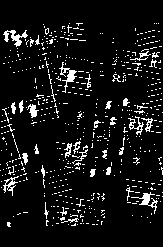
| WISDOM OF THE
IMPULSE On the Nature of Musical Free Improvisation
Tom Nunn |
|
| This
comprehensive work is amazingly thorough and exhaustive.. tremendously
interesting and readable, though scholarly, researched, footnoted
and all the rest. Best idea for me is simply excerpt a few paragraphs to
give the reader a taste of the content and it's readability.. here
goes... The big question often asked
by those about to try free improvisation for the first time is, Let's say three musicians who
have never improvised before and who normally read music In truth, free improvisation is not made, ut us allowed to make itself. The free improviser allows INFLUENCES to work, allows the music to form itself through his/her body and mind, and just as importantly, the group mind. But what necessarily goes along with this is a certain kind of intense concentration on the music as it happens (as well as some level of technical proficiency). What the three novice improvisers (in spite of their technical proficiency) are failing to do is simply to listen. Each one is so focused on what she/he is responsible for individually that there is little or no attention to the potential music, itself. As elementary as this seems, it is perhaps the greatest hurdle, initially, in learning to free improvise. .....
In that period of silence just before a performance begins, the free improviser should ideally have nothing in mind, the first sound being entirely impulsive. The instant the sound is heard, the music begins; everything from here on is responsive, whether consciously or subconsciously. And being a performance, the response is necessarily spontaneous. The Intelligent Body goes to work, not only generating sound, but generating musical ideas as well, ideas which capture the attention of the Intellect....
Music, itself is fleeting--it's here, it's gone. The next time is different, never the same. Change is the dynamic basis of music, of cours: it is a temporal art articulated through change over time moment by moment.. And, of course, change functions historically, period by period, cycle by cycle.....Change, after all, is the succor of creativity.
Nunn forages topics such as the Complex Nature of Processes, Confounding Principles of
Complexity, the Voice of New Music, the Voice of Improvisation, Education
and Group Exercises.. Discussions, Examples, Live -Davey Williams
. |